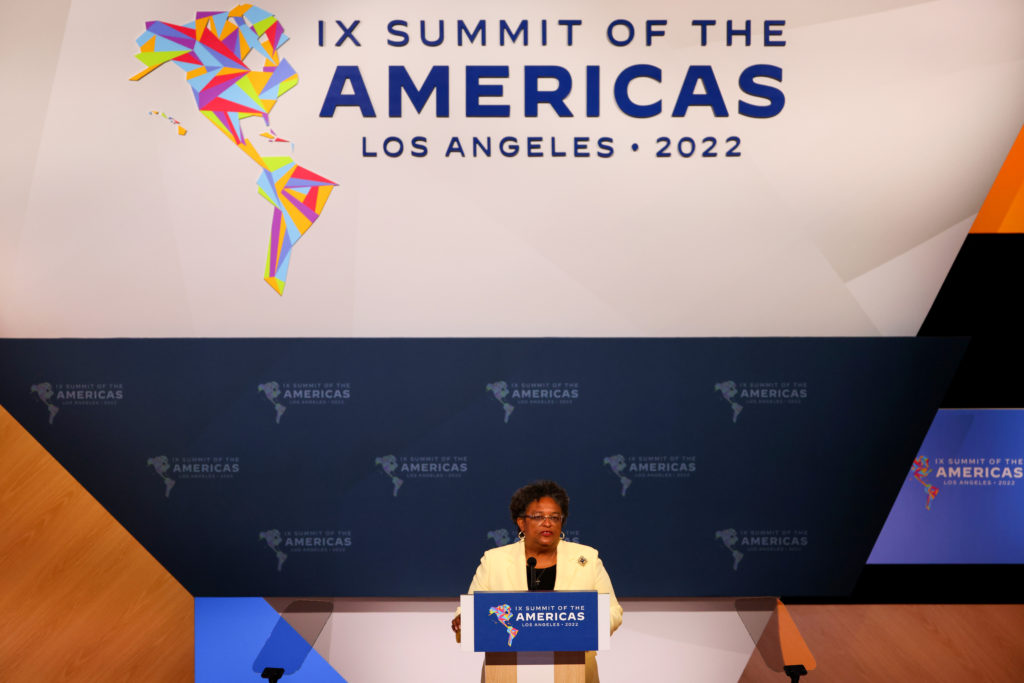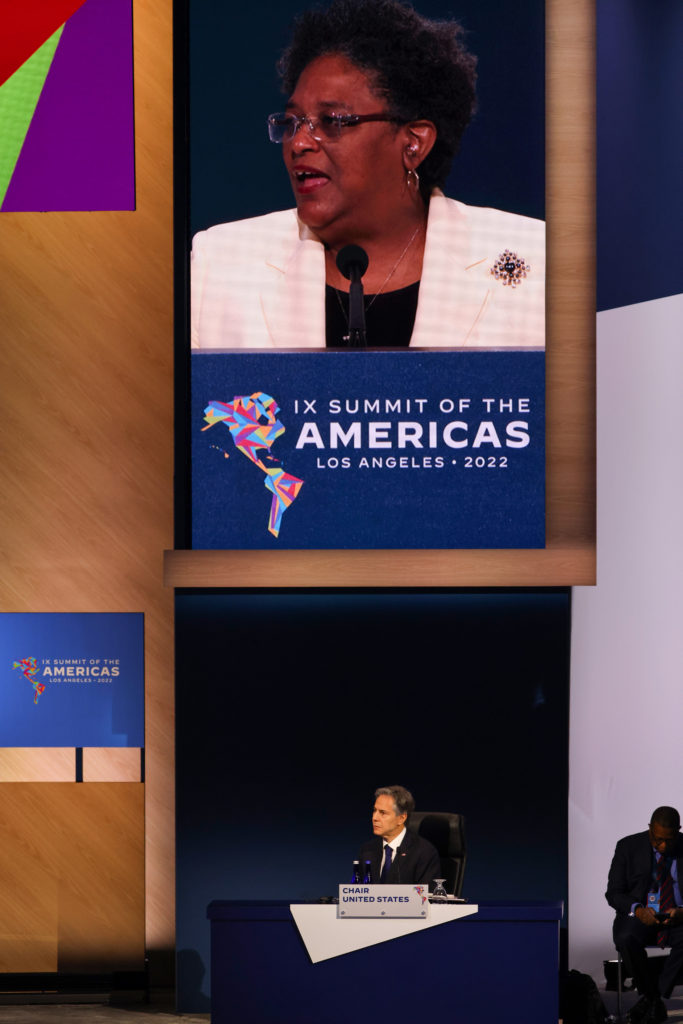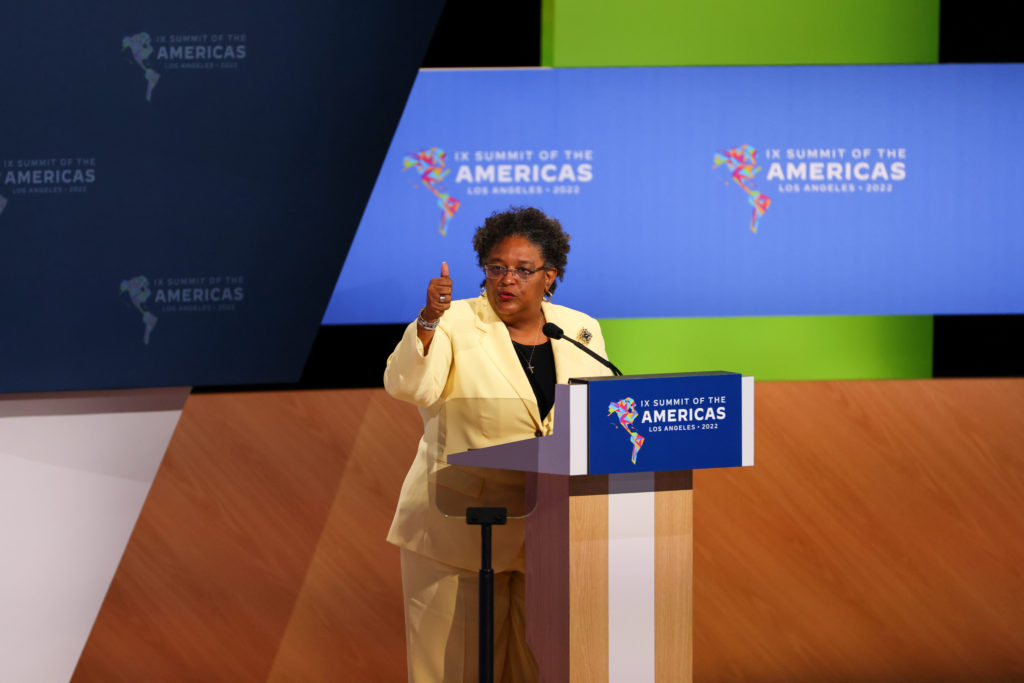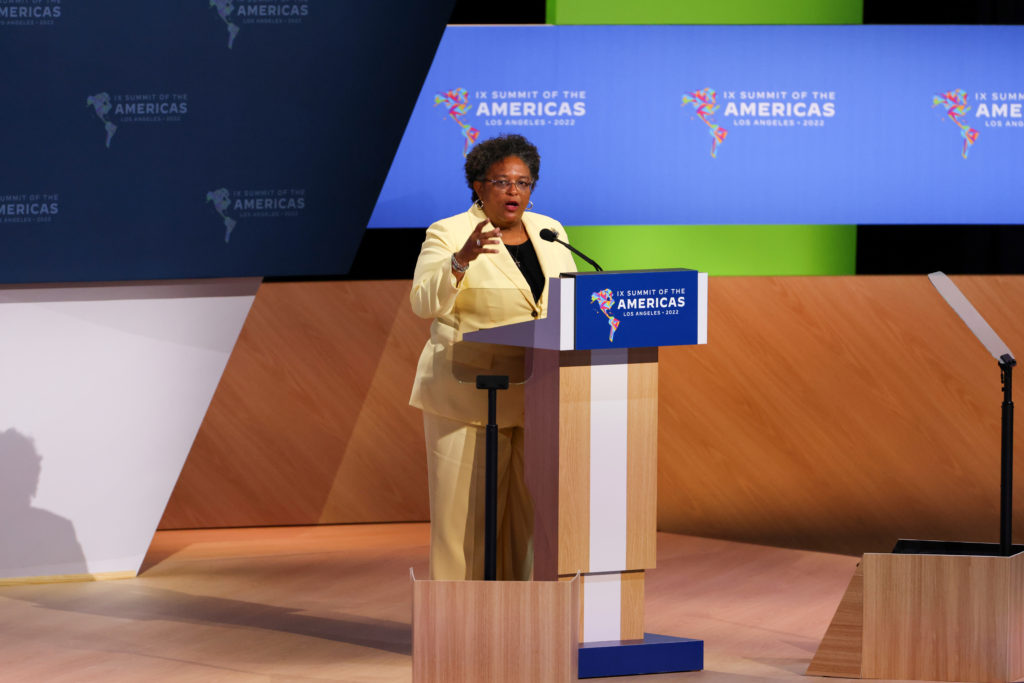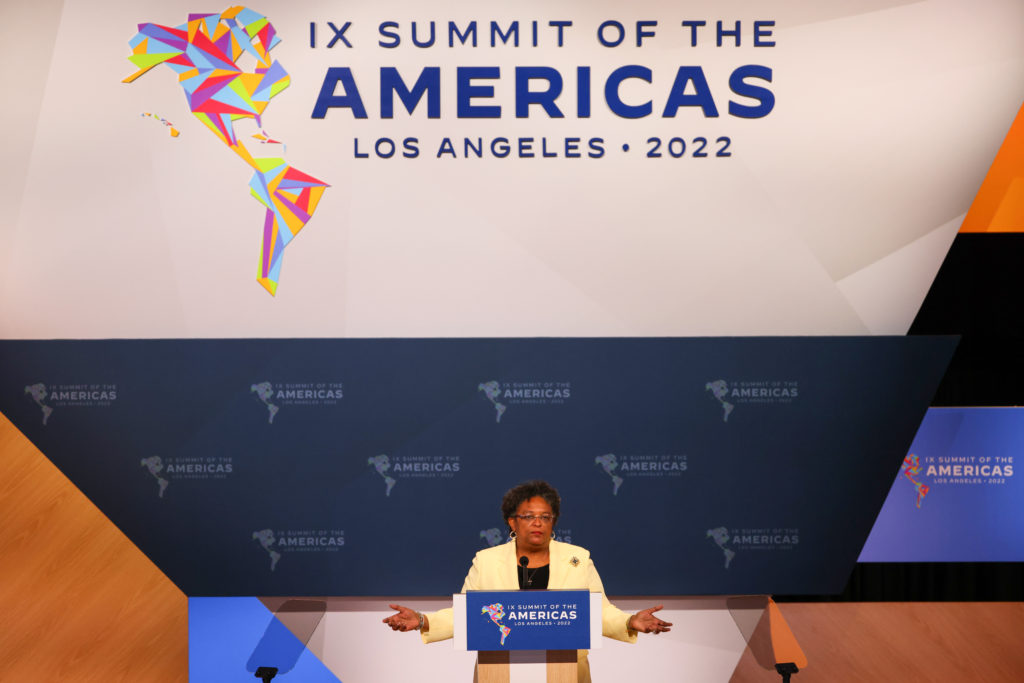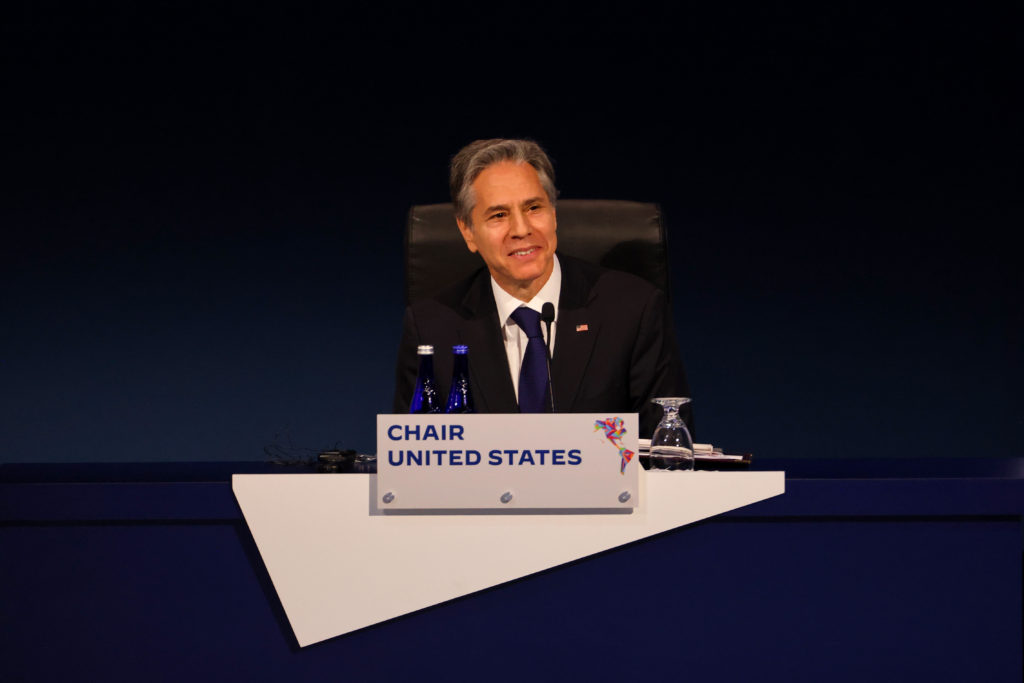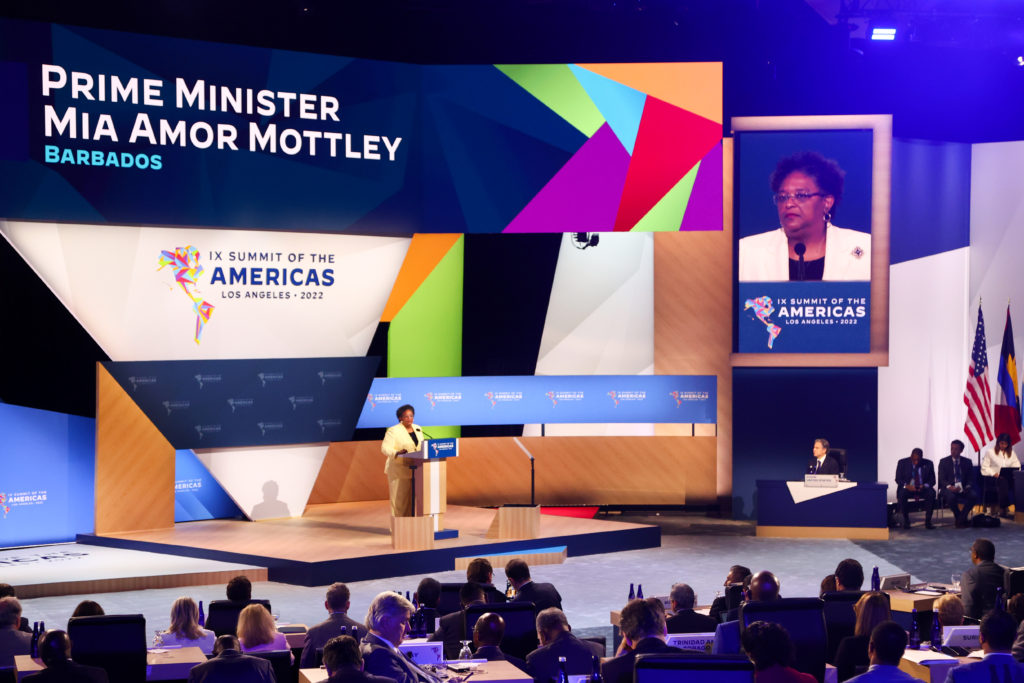
Mia Amor Mottley:
“Bless my eyes this morning. Jah sun is on the rise again. The way earthly things are going, anything can happen.”
Mr. Secretary, there is so much trouble in the world. Excellencies, there is so much trouble in the world. Heads of Government, there is so much trouble in the world. Heads of State, there is so much trouble in the world.
I’ve chosen the language of Bob Marley this morning not because I’m an apostle of Bob, as you probably have realized by now, but also because he reminds us of the day-to-day reality of our people and of our citizens.
And we have come to Los Angeles hopeful that we’re not just going to engage in speeches or we’re not just going to engage in platitudes, but we go home to make a difference to people at perhaps the most difficult time this world has seen in 100 years.
We have three global crises and any one is sufficient to bring us down. The climate crisis hurts from you here in California in fires, to us in the Caribbean through the heart attack of hurricanes, and the chronic NCDs of water crises and droughts or floods, depending on where you go. We fight the pandemic.
And even as we talk about the pandemic, we need to start to qualify it because we fight the COVID pandemic without realizing that the slow onset pandemic of antimicrobial resistance is already upon us, being fueled further by how we farm, how we treat each other with the abuse of antibiotics, and how we literally allow those things to flow into our environment and contaminated water system.
And as if that was not enough, we now fight the prices of food and fuel and fertilizer, knowing full well that the only destination thereafter is going to be a debt crisis and an economic crisis if we do not intervene to break the slide.
My friends, how much more evidence do we need?
“You see men sailing on their ego trip. Blast off on their space ship, million miles from reality. No care for you. No care for me.”
If I could have sung it, you would have joined me.
But I don’t need you to join me in the words of this song. I need you to join us in the chorus of action that our people need, not want. Our people need immediate intervention. Six-week crops and 12-week crops is what is going to feed our people.
We need to be able to shield them from the price of fertilizer that is making their efforts almost impossible. We need equally to recognize, as you heard Prime Minister Browne and Prime Minister Davis say already this morning, that the debt crisis is already among many developing countries. We simply do not have the fiscal space to respond to crises not spawned by ourselves, but spawned by others.
And we are facing a double jeopardy.
Our countries were those from whom wealth was extracted in order to build the developed world. Our countries were left at independence with no compact, no money to finance basic rates of housing and health care and education.
And when we fought to do it, now we find ourselves having those efforts crowded out literally by our inability to be able to face and find the money, because we are using it to recover from climate crises, not of our own making.
Where does the double jeopardy come that it is the very industrial revolution that the blood, sweat and tears of our ancestors financed, that is now causing us not to be able to respond to the needs of our people in the most basic of ways that humanity requires.
My friends, there is so much trouble in the world and we think we found a solution, but we want to tell people only about financing after the climate crisis. We need to be able to prepare before the crisis so we can reduce what we have to spend, by seven times. We need to recognize that adaptation has no private-sector-follower because there is no return on investment in adapting to the climate realities. That is the function of the State and therefore the international community is required in the justice of the moment to help us prevent loss of life and property for a crisis we didn’t create.
We need to reform the international financial institutions architecture. How can we have an international bank for reconstruction and development that does not reconstruct and develop in today’s world? Where is the reconstruction from the climate crisis being financed? Where is the reconstruction from the pandemic being financed – the post-pandemic recovery. Where is the platform for middle income countries that house 75% of the world’s poor? But because they are middle income, we don’t remember that. Where is the climate finance being targeted to, justifiably and fairly so, when the numbers show that only 15% of climate finance is going to the climate vulnerable countries?
I have not come here just to use words. Let us be practical. We have a duty to solve a few problems. And I think that the format of this meeting needs to change if we are to be able to see real progress and not simply to be part of the problem. We need to talk with each other and not talk at each other as we are doing in set-piece speeches.
We need to engage and see how we can make a difference in a real way. We have migrants coming, not because they choose to come, but because it is their last option. They don’t choose to leave who they love and where they love, willingly. And when they come, we now know that we don’t need to treat them poorly because this year has shown that there’s a dignified way to treat migrants. We’ve seen that in Europe. We need to see it in the Americas. And I don’t place that burden on the United States of America alone. I place it on all of us, including my own country, because we cannot be part of the solution by simply talking from outside and not literally putting our shoulders to the plow.
The International Organization of Migrants needs our support. And we need to make sure that as we reform the Organization of American States, that instead of it seeking to become a political player, it needs to become a player that simply brings opportunity to our people in the Americas, from Alaska to Chile. And how does that come? If we did nothing else in the next decade in the OAS but to allow our people to become bilingual and trilingual – people under 18 and adults – then we would change economic possibilities of this hemisphere in ways that we can’t even contemplate.
We need to ensure that if we fight this climate crisis injustice, then we fight it not just as Small Island Developing States (SIDS) and developing countries calling for fairness for our nations, but we provide that fairness to our people. And how do I mean? We have taken a decision in Barbados that there can be no award of any contracts for renewable energy without taking into account the bounty that must go to our people. And therefore, accordingly, this year I announced that every rooftop that is owned by anyone in Barbados will have the right to have placed on it as a right, not a choice, not a right to apply, as a right. Photovoltaic systems from 2.5 Kilowatts to 5 to 10 to 20. Why? Because we don’t own individually the wind, the sea, and the sun. It is the patrimony of the nation. And if we are to move our people out of poverty, then we must use the bounty that is afforded to us through renewable energy, good jobs, but also good investment to allow our people to benefit.
And we ask you to recognize that we must not only engage in platitudinous comments about what we can achieve with net zero. Net zero does not mean fossil fuel free. It means, still, that there will be 20% energy coming from fossil fuels. We know natural gas is that clean fuel. But as we do it, let us recognize that it is not possible to exclude those developing countries who have now the opportunity to finance their way to net zero, simply because we want to keep the world in the construct of the old imperial order in which it is found.
Whether it is a reform of the international financial institutions or whether it is moving ourselves into a new reality, we cannot continue to cement the inequalities of an old imperial order. And that is why I have come also to thank President Biden and Vice President Harris. For too long, there has been benign neglect. And the Partnership for the Americas, as well as the Climate Partnership Pact 2030 offers us a real possibility of hope. But it is up to each of us to keep and hold each other accountable.
We are happy that coming out of yesterday we made progress that we didn’t see the day before. And we hope that tomorrow we will build on this subcommittee’s that will make a real difference on energy security, food security, and finance access that will mean that we can look our people in the face and say, we have done right by you. We cannot achieve it overnight, but we are moving in the right direction.
And we must also address the reality of exclusion, not on the exclusion of individuals in our society through racism and class prejudice, but exclusion of countries from the ability to participate in the financial system by having us derisked, by having correspondent banks: Belize – 83% of its banks have been de-risked. How do the people of Belize do trade with the rest of the world, with the United States of America, if their people cannot bank, can’t send remittances? If we are told our institutions are too small to matter and therefore it is better not to do business with us. Are we to become financial pariahs in a world at the same time that we seek to bring equity? There is so much trouble in this world.
If we think we’ve found a solution, it must not, in the words of Bob, be another illusion. We ask you to also recognize that let us use our cooperative efforts to build joint platforms for procurement so that we can reduce the price of critical goods from vaccines to water pipes to all other kinds of things that are impairing our ability to deliver proper services to our people. Africa did it with the African Medical Supplies Platform. Why can’t we have an American Supplies Platform that treats to the most critical supplies?
And why?
In the Caribbean we make an order and they say, “What? That’s too small for us.”.
We announced a tax holiday for electric vehicles. We cannot get the supply of electric vehicles. Will Brazil help us? Will India help us? Will the United States or will Canada help us? We can’t get access to batteries in order to help us become net zero by 2030. But yet we want to come on these platforms and talk about it. These are the real problems that I hope Pact 2030 will allow us to solve. And when we finished with Pact 2030, Canada and Chile and all of the others, can we create that platform for that joint procurement to reduce the price of supplies and to guarantee access to our people?
My friends, I have spoken too long, but I cannot leave this platform without saying that we have to speak some home truths to each other.
It’s wrong that Cuba and Venezuela and Nicaragua are not here, because as you heard from Bahamas, that we need to speak with those with whom we disagree and we don’t only need to narrow-cast. That’s the part of the problem of the world. There’s too much narrow-casting instead of broadcasting. There’s too much talking at, instead of talking with.
But secondly, those countries must equally recognize that you cannot want to fully participate if you’re not prepared equally to engage and to see progress. And the simple priority must be people, not ideology. If we can make progress for people, if we can allow people to speak different languages, if we can create a minimum floor of education and health care for the people of the Americas, then my friends, the City of Angels would have played its role in the history of the Americas.
I hope that we leave here today conscious that we must never again come to a summit to talk at each other, but simply to talk with each other in partnership and for the purpose of the prosperity of our people.
Thank you.
June 10, 2022
